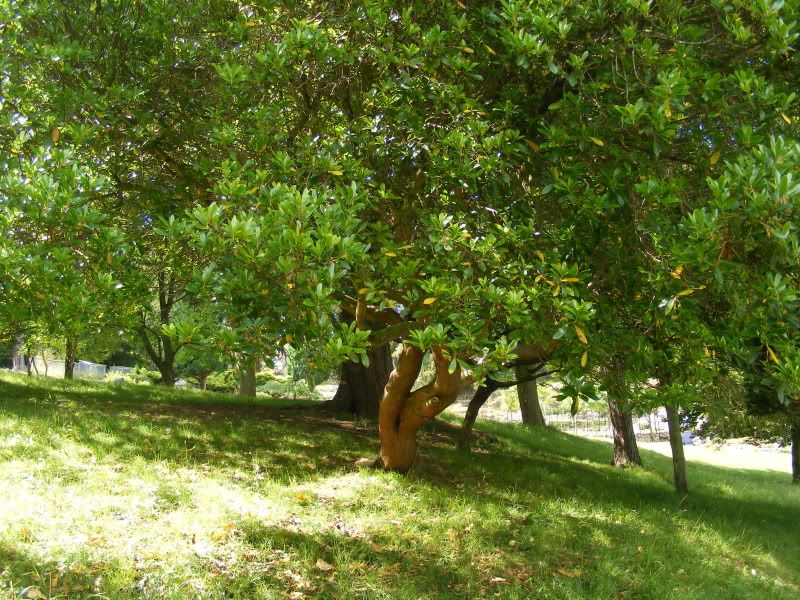Arbutus unedo
-
stephenprudence
Arbutus unedo
Apparently there is an isolated pocket of wild Arbutus in SW Ireland. Given it's close proximity to the UK, I wonder what the chances of naturalisation is in the UK.. had anyone noticed a naturalised Arbutus unedo in the UK?
-
Darlo Mark
Re: Arbutus unedo
I planted one last June and it survived -15 without any protection. It has been one of my few successes as I started gardening at the start of our severe winters. It has grown well this year. I see no reason why it couldn't naturalise here.
-
bobbyd44
Re: Arbutus unedo
mine stuggled through lst winter.. grown back though.. one at chester zoo is fantastic..
Re: Arbutus unedo
I'm sure it could naturalise, if it were given the opportunity - but I can't see it happening in such a tightly controlled environment as Britain. If one germinated in a nature reserve it would be pulled out as an invasive non-native weed, and anywhere else, it would get grazed, ploughed, mown, or concreted to death.
-
billdango
Re: Arbutus unedo
There are some huge specimens in Southampton.
some of these are 20 feet tall and the same in width and are covered in nice big tasty strawberry like fruits.
These fruits are edible but a bit gritty to the taste but that said they make a tasty mouthfull.
These trees are worth a place in any garden.
billdango.



some of these are 20 feet tall and the same in width and are covered in nice big tasty strawberry like fruits.
These fruits are edible but a bit gritty to the taste but that said they make a tasty mouthfull.
These trees are worth a place in any garden.
billdango.
-
Trainer John
Re: Arbutus unedo
It may well have been about 8-10,000 years ago during the (quite a lot warmer than today) Atlantic period. Unfortunately the cold returned and all that was left was the relict population in SW Ireland.
It's a Mediterranean plant that really needs warmer summers than we have to offer to successfully naturalise. Now, if you planted a grove of them you might get some seedlings - but I doubt that they'd spread very far.
It's a Mediterranean plant that really needs warmer summers than we have to offer to successfully naturalise. Now, if you planted a grove of them you might get some seedlings - but I doubt that they'd spread very far.
Re: Arbutus unedo
Don't think so - other Med species like Pinus pinaster and Quercus ilex can regenerate readily and naturalise in the few places where they can escape human land control.Trainer John wrote:It's a Mediterranean plant that really needs warmer summers than we have to offer to successfully naturalise.
Arbutus unedo was never present in Britain during the Atlantic period; the Irish population came through the last glaciation on land (now below sea level) to the southwest of Ireland, not from the Med. Same goes for the (now extinct) native Irish Pinus sylvestris populations (and also those in the far west of Scotland, Loch Maree area).
There's also supposed to be a small population of wild Arbutus in Galway in northwest Ireland, it isn't confined to the southwest. Never been able to find any details about this population though.
-
Darlo Mark
Re: Arbutus unedo
Mine has grown well this year and Darlington certainly does not have a Med climate 
-
Junglejames
Re: Arbutus unedo
They have naturalised not so far from you in Wales on Great Orme (Llandudno). Im not surprised I cant see much difference between West Ireland and Most of Wales.
Sorry for the long links - cached or documents
Under cotoneaster/strawberry tree (DEFRA):
HERE
http://webcache.googleusercontent.com/s ... ogle.co.uk
Sorry for the long links - cached or documents
Under cotoneaster/strawberry tree (DEFRA):
HERE
http://webcache.googleusercontent.com/s ... ogle.co.uk
Last edited by Dave Brown on Tue Aug 23, 2011 6:14 pm, edited 2 times in total.
Reason: Embedded URL into text as URL length was so long it broke the page
Reason: Embedded URL into text as URL length was so long it broke the page
-
stephenprudence
Re: Arbutus unedo
I imagine the Arbutus colony has been completely wiped out off the Orme, I doubt it would have been able to sustain itself if there was a clearance programme. There is however an Arbutus unedo in Happy Valley gardens in Llandudno. Photo below.
Here's the one in the gardens, certainly not naturalising though.

Here's the one in the gardens, certainly not naturalising though.

Re: Arbutus unedo
Not surprising, the seedlings can't outcompete lawnmowersstephenprudence wrote:Here's the one in the gardens, certainly not naturalising though.
-
Troppoz
Re: Arbutus unedo
These lovely trees are planted quite a lot in the hotter dryer parts of inland Australia where they are considered to be a drought tolerant species. This is really surprising considering their Irish origins!
I remember one that was planted in the school grounds of my former highschool when I lived in Wagga Wagga in inland New South Wales, it thrived in the dry summer heat with temps up to 45c, never looking like it was stressed at all. Then those lovely lily-of-the-valley flowers and the bright red fruits, all the while displaying beautifully patterned bark.
I was always told they were toxic and inedible so never tried them - what do they taste like?
Sean
I remember one that was planted in the school grounds of my former highschool when I lived in Wagga Wagga in inland New South Wales, it thrived in the dry summer heat with temps up to 45c, never looking like it was stressed at all. Then those lovely lily-of-the-valley flowers and the bright red fruits, all the while displaying beautifully patterned bark.
I was always told they were toxic and inedible so never tried them - what do they taste like?
Sean
-
Kiwirichard
Re: Arbutus unedo
I commonly see Arbutus about the various gardens i visit and have certainly never noticed them spreading into wild areas,which is good because so many European plants have become pest plants within New Zealand.
-
RogerBacardy
Re: Arbutus unedo
There's a big one in Kelsey Park, Beckenham (borders of South East London and Kent). Must be decades old. My kids love climbing on it, and I never realised it was a strawberry tree until a year or so ago.
A woman in the park info room confirmed that the fruit from this tree was something you only tried once.
A woman in the park info room confirmed that the fruit from this tree was something you only tried once.
Last edited by RogerBacardy on Mon Aug 22, 2011 9:50 am, edited 1 time in total.
Re: Arbutus unedo
I've eaten the fruit several times, they're not toxic at all, just rather boring - no flavour to speak of, and a gritty texture in the skin. In Spain they make a liqueur from them, though.
Troppoz - the species is also widely native in the Med, and Med origins will tolerate heat and drought very well.
Troppoz - the species is also widely native in the Med, and Med origins will tolerate heat and drought very well.
